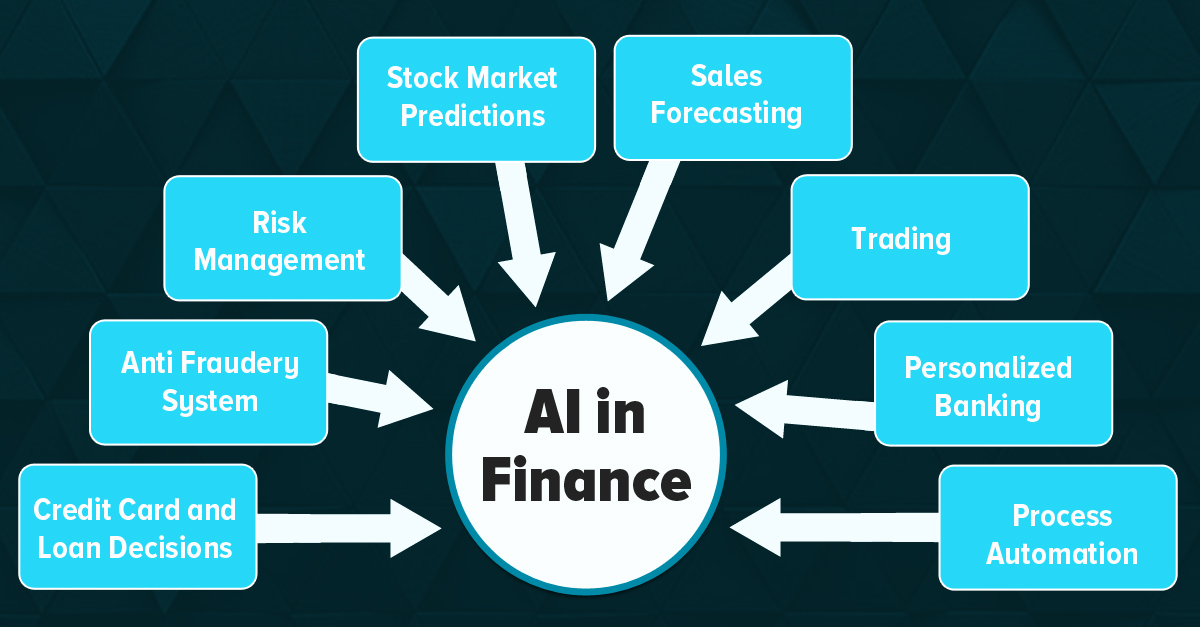Use Cases of AI in the Finance Sector

Since its inception, Artificial Intelligence (AI) has come a long way both as a concept and as a technology. Today, AI is an integral part of the most demanding and fast-paced industries across verticals. One of such sectors in fin-tech services and AI has well asserted its importance to the sector well enough.
Let’s look at some of the essential application areas of AI in fin-tech and banking.
Credit Card and Loan Decisions
Making credit card and loan decisions is a process that spans a majority of the workforce in the finance sector. Using AI systems can automate this process and reduces the cost and effort involved significantly. AI systems can consider a broader set of characteristics (as compared to humans) when assessing a profile for a credit card or loan approval. Further, using AI systems rules out any human bias at play, hence making the whole process fair and transparent.
AI as Anti-Fraud System
AI-based anti-fraud systems learn on the fly and improve their efficiency to detect, report, and block a fraudulent transaction or activity. With the exponential increase in online transactions, fraud threats and incidents have also increased manifold. Thanks to the AI-systems’ ability to learn and adapt, banking and finance institutions have a tool that can keep in step with the rising threats of fraud.
AI in Risk Management
AI systems provide banks and financial institutions with adaptive and intuitive tools to detect potential threats and risk exposure. These systems are equipped with cognitive abilities that can process both structured and unstructured data to scrutinize the history of risk cases and raise alerts at signs of potential future risks.
AI-systems also significantly reduce human error margin and are capable of considering a more extensive amount of data and factors to make their decisions. Comparable performance would require the AI system’s human counterparts to put in significantly more effort and cost.
AI in Stock Market Predictions and Trading
Over the last few years, data-driven investments have become a prominent segment of the stock market, amounting to a whopping USD 1 trillion in 2018. AI systems provide a faster analysis of both structured (spreadsheets, databases) and unstructured (news, social media updates, etc.) data related to stock markets, which lead to quick decision-making.
Further, AI systems can deduce predictions based on the data available to them in real-time and hence result in more beneficial financial transactions. In an environment as fast-paced as the stock market, reducing the time involved in these processes can prove to be the primary reason for higher profits.
AI in Sales Forecasting
The analytical abilities of an AI-based system are unquestionable, owing to its computational prowess. AI solutions enable your business to improve its lead scoring capability, refine the understanding of the target segment and their preferences, customize product features and discount offers according to customer expectations, etc. AI systems can analyze a colossal amount of historical and real-time data to help you accurately forecast the sales numbers in the period of your interest.
AI in Personalised Banking
Personalized banking is among the domains where we see the true excellence of AI systems. AI-powered smart bots handle a majority of customer grievances today and provide the clients with efficient self-help interfaces. AI-based virtual assistants like Google Assistant, Siri, Alexa, Echo, etc. are already gaining traction in the consumer markets. Furthermore, these systems are adaptive and capable of learning on their own; hence, they learn on the fly to customize their answers and improve client experience.
AI in Process Automation
Process automation is central to boosting one’s productivity and minimizing operational costs. AI-powered systems are capable of generating reports, review documents, and extracting information from various materials like agreements, applications, etc. Using AI systems to automate high-frequency repetitive tasks reduces the human intervention required for these tasks and reduces costs by 50%-70%, as reported by E&Y.
Conclusion
With the exponential growth and digital transformation, the banking and fin-tech sector is experiencing, Organizations in this sector need tools that can adapt themselves to counter the changing nature of threats. AI-powered solutions are among the most important tools that organizations in fin-tech can implement to ensure high productivity, security, and efficiency.
If your organization is looking to amp-up its defenses using AI-based and computer vision-enabled banking solutions or improved productivity and efficiency using deep learning AI solutions, get in touch with AISmartz (among the top AI consulting firms and computer vision solutions providers in NY).
 1-888-661-8967
1-888-661-8967

